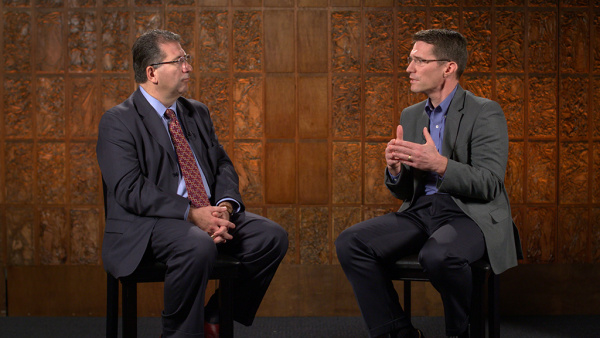Horn: This semester we have been working our way through the BJU Creed that we recite every day. And we’ve been reciting that Creed since the University began. And this semester every Wednesday, we come together, and we are examining a different part of the Creed. And our series title is “I Believe: Foundational Truths for a Living Faith.” And today I have Dr. Brent Cook who is in the studio with me who is one of the men who is preaching through that series. Dr. Cook has been a Seminary and School of Religion professor now for many years and I think you mentioned as we were talking before that you also pastor University Baptist Church. So, it’s—I’m real excited to have you on today.
Cook: Thank you. Glad to be here.
Horn: Tell us a little bit about the Creed and what the Creed has meant to you over the years.
Cook: Well, I value creeds, as I said in our last segment, because the Bible is such a big book. But if you can distill it down to core
principles, core truths, essential truths—What are those truths? And I think a creed is so critical. And historically, they’ve always been critical in the expression of the Christian faith. And I think creeds are also so critical because God has revealed Himself to us. We have a faith in which God has made Himself known. God has told us things about Himself that we would not otherwise know. And so, a creed is a statement of what God has done for me.
Horn: That’s exactly why I wanted to have this conversation. Because as we take apart the Creed this semester, and we think about the main ideas of the Christian faith and what they say about God to us, that’s of the essence of a living faith. And so, what I’d like to do in our conversation today is talk about a particular part of the Creed that you had the opportunity to preach to us last week when you came and spoke to us on the Incarnation and virgin birth of our Lord Jesus Christ. Our Creed begins, “I believe in the inspiration of the Bible, both the Old and the New Testaments; the creation of man by the direct act of God; and the Incarnation and virgin birth of our Lord and Savior Jesus Christ.” And so, that was your topic. So, tell me a little bit about how you came at that.
Cook: Well, my background is church history. And for years I would read through the church councils. And I was just always so smitten by the fact that they’re constantly talking about the humanity of God and the Incarnation of God. And when you read the church fathers they are constantly going back to this topic of God’s Incarnation. It is of supreme—absolute supreme—importance to them.
And I began to think about us in the modern church, how little we think about the Incarnation. And what’s really surprising is not so much how much the ancient church thought about the Incarnation but how little we do in the modern church. Because in the early church they realized that in Christ, the two worlds that have been estranged—God’s world and man’s world, the fallen world—can be reunited, can be regained through the humanity—literally, the humanity of God.
In the incarnation, God introduces humanity into His Trinity, and that’s the point where God is able to reconcile Himself with man. Man’s able to be reconciled with God, perhaps I can say that more clearly. It’s in Christ that—in His humanity that God suffers for our sins. It’s in His humanity that God resurrects in order that we can live with Him forever.
Horn: You know, I think I was struck as you said it today, and even as I listened to your message, about the fact that God actually introduces humanity into the Trinity. I’d never really thought about it that way. And I went back to the controversies at the beginning of the last century that sort of gave rise to historic fundamentalism and what was the question—at that point was the deity of Christ. And there was a great emphasis on Jesus just being a man. And so, historic fundamentalism rightly rose to defend His deity. But actually, I agree with you. We’ve sort of lost sight of His humanity in this generation.
Cook: That’s right. Yeah. And if you look at, for instance, 1 John. John begins with a major emphasis on the Incarnation: that which we have seen with our eyes, we’ve heard him with our ears, we’ve touched him, our hands have handled him, the Word of Life. That same emphasis you find at the beginning of John’s Gospel: “The word was made flesh.”
And so, in the early church, the emphasis is really on the humanity of God. Now, the virgin birth is supernatural. There’s no human intervention—male intervention in Jesus’s birth. Clearly, it’s supernatural. But you can so emphasize the supernatural side of it that you forget that this is equally natural and that God has come into human nature and that God has assumed human nature.
Gregory of Nazianzus, the Church Father, said that God can redeem everything that He assumes, so He must assume the entirety of human nature in order to redeem all of human nature. So, in the early church, I mean, the emphasis is really on the fact that God really did become human. And you’re exactly right. In the modern time—times we really think of the supernatural character, the deity of Christ. And both are absolutely essential—that the God-man is both 100% God and 100% human, the hypostatic union bringing the two together.
Horn: So, as I listened to the message, you made an astonishing comment that I haven’t been able to get out of my head. And it was this: You mentioned that God cannot occupy the same space at the same time as man.
Cook: Right.
Horn: And you took us through a theological overview of that truth throughout your sermon. You started with the Garden of Eden. You started with the tabernacle and then later the temple and then Jesus’ coming, and really addressing that point. So, there is something unbelievably monumental that happened when all of a sudden there is God and man in the same space at the same time. Speak to me a little bit about that.
Cook: Yeah, well, we don’t want to call into question God’s omnipresence. I mean God is everywhere. God fills every particle of space equally. But theologically speaking in terms of God’s relationship to human sin, He cannot abide human sin. He doesn’t want to be in the presence of human sin.
And in the book of Genesis when man falls, it feels like God’s glory just lifts off the earth, as it were. It disappears. In fact, you never read the term “glory” associated with God in the book of Genesis.
And so, all through the Old Testament, there is this attempt on God’s part, as it were, to come back into creation and to be united with His fallen creation again. But it’s very, very complex.
So, you have this construction of a tabernacle. But when it’s all complete God’s glory goes, and He dwells in this little room behind the curtain, and we can’t go in there. If we go in there, we’re dead. When God comes in His glory on the top of Mount Sinai, God says if anybody even touches the perimeter of Mount Sinai, he’s gonna be struck dead. Or you think about Uzzah. He reaches out and he touches the Ark where God’s presence is, and he’s struck dead.
But all of a sudden God comes into human nature in the person of Jesus Christ, and here was a woman who reaches out with an issue of blood, and she touches Him. And she lives, and she’s restored. And Jesus Christ, in His resurrected body, tells Thomas, “You reach out, and touch My hands. Feel the scars. Touch my side.” God’s glory is still there, but we can now graph God.
We are united with God through the Incarnation of God and that’s—it’s a permanent new reality. The way that God has chosen to redeem us is not for us to become gods. That’s what the ancient Romans taught. It was for God to add humanity to Himself and then never to lose that humanity. Oftentimes we think of the Resurrection as undoing the Incarnation. And this is a huge mistake. The Resurrection makes the Incarnation permanent.
Horn: Brent, let me ask one final question as we kind of wrap up our conversation today. I have a lot to think about as I meditate over your sermon and even this conversation today. And I’m really hoping that the body of Christ will benefit from not just the series we’re doing, but from what you’ve said about the humanity of Christ. Maybe we could end this way: What is the danger—what happens to the Church when we lose sight of the humanity of Christ?
Cook: Well, you can go back to the early church, and one of the big dangers was Gnosticism. Gnosticism postulates that there’s this
higher world above, and this world above is the only reality, and we want to escape the creation below. It turns very easily into asceticism.
You look at the early monastic movements, and there’s the same idea. We’ve got to escape creation. We’ve got to leave it all behind, and we’ve got to be reabsorbed back up into this higher realm.
And that tendency I think is still with us today. I think it shows up in our eschatology. “This world is not my home; I’m just a-passing through,” we sing. But then we’re kind of confused because we sing, “This is my Father’s world, I rest me in the thought.” Well, which is it?
And the fact is that this is God’s world. It’s created, but it’s fallen. But in the end, He’s restoring it. And our attitude toward creation and toward the goodness of God’s creation needs to be shaped by the fact that God became incarnate in Jesus, remained incarnate in Jesus.
And what that does is it really gives us a better appreciation for what God said way back in Genesis when God completed His creation. He said this is very good, and that included two human beings.
And we know that God really meant that because of the Incarnation. God becomes what He made in order to live in a human body in that new creation forever. So, I think it changes everything in terms of our attitude toward creation all around us.
Horn: Well, Brent, we’re out of time, but that was a powerful reminder of the value of the humanity of Christ, and I hope that all of you who are listening to this will take time to go and check out the sermon and be blessed as I have been. Thank you, again, Dr. Cook.
Cook: Thank you.
Join us for chapel every Monday through Thursday at 11 a.m.







